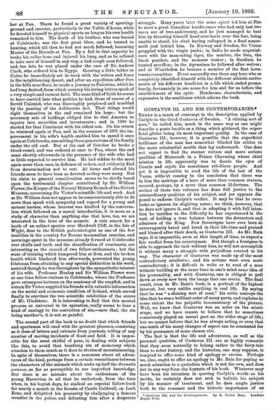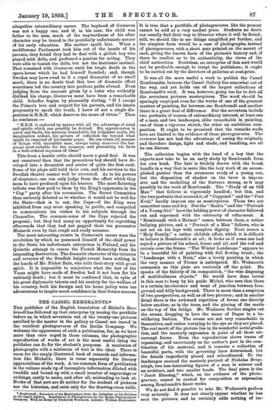GUSTAVUS III. AND HIS CONTEMPORARIES.* THERE is a touch of
contempt in the description applied by Carlyle to the third Gustavus of Sweden. "A shining sort of man," he called him, mach in the same way as one might describe a paste buckle as a thing which glittered, the super- ficial glitter being its most important quality. In the case of Gustavus III., however, it is possible that the superficial brilliance of the man has somewhat blinded his critics to the more substantial merits that lay underneath. One does not expect to find the sterner virtues and more serious qualities of Statecraft in a Prince Charming whose chief mission in life apparently was to dazzle the eyes of Courts and cajole his sometimes rebellious people. And yet it is impossible to read the life of the last of the Vasas, withcut coming to the conclusion that there was in him the makings of a hero of more than common stature, marred, perhaps, by a more than common ill-fortune. The author of these two volumes has done full justice to the extraordinary qualities of his subject, and yet appears dis- posed to endorse Carlyle's verdict. It may be that he over- looks or ignores its slighting sense ; we think, however, that he does not ignore it, and that in adopting it with full inten- tion be testifies to the difficulty he has experienced in the task of holding a true balance between the detractors and admirers of the King. Few Sovereigns have ever been io extravagantly hated and loved in their life-time and praised and blamed after their death, as Gustavus III. As Mr. Bain says, it is impossible, even at this length of time, to expect a fair verdict from his countrymen. Bat though a foreigner is able to approach the task without bias, he will not accomplish it without many a struggle with prejudices created in his way. The character of Gustavus was made up of the most contradictory attribute;, and his actions were even mote contradictory ; it is difficult to write or to read of a man without building at the same time in one's mind some idea of his personality, and with Gustavus, one is obliged to pull down at every new turn the image that one erects. The final result, even in Mr. Bain's book, is a portrait of the highest interest, but very unlike anything in real life. By saying that he was" a shining sort of man," his critic conveys the idea that he was a brilliant actor of many parts, and explains to some extent the too palpable inconsistency of the picture. Well, we know that Gustavus was an actor on the mimic stage, and we have reason to believe that he sometimes consciously played an unreal part on the wider stage of life ; but we cannot believe that he was always acting, or even that one-tenth of his many changes of aspect can be accounted for by his pursuance of some chosen role.
The fact is that the life and adventures, as well as the personal qualities, of Gustavus III. are so highly romantic that they seem naturally to belong rather to the fairy-tale than to sober history, and the historian, one may suppose, is tempted to offer some kind of apology or excuse. Perhaps we, also, ought to offer an apology to Mr. Bain for paying so much attention to a quotation which is not his own, and does not in any way form the keynote of his book. Whatever may have been his intention in quoting Carlyle's words as his motto, he certainly does not seek to belittle his subject by his manner of treatment, and he does ample justice both to the romance and the historic importance of an • Gustavus III. and his Csntemporaries. By R. Nisbet Bain. London: ICegan Paul.
altogether extraordinary career. The boyhood of Gustavus was not a happy one, and if, in his case, the child was father to the man, much of the waywardness of his after character may be traced to the peculiarly unfortunate nature of his early education. His mother spoilt him. When a meddlesome Parliament took him out of the hands of his parents, they found they had to deal with a girlish boy who played with dolls, and professed a passion for acting. They were able to banish the dolls, but not the histrionic instinct.
That remained with Gustavus until his tragic death in the opera-house which he had himself founded ; and, though Sweden may have owed to it a royal dramatist of no small merit, there is no doubt that this love of dramatic effect sometimes led the country into perilous paths abroad. Even judging from the account given by a tutor who evidently disliked his charge, Gustavus must have been a remarkable child. Schaffer begins by pleasantly stating, "If I except the Prince's love and respect for his parents, and his innate propensity to speak the truth, I know of not a single dis- position in H.R.H. which deserves the name of virtue." Then he continues :—
" H.E.H. is endowed by nature with all the advantage of mind and spirits which can possibly be desired. His apprehension is quick and facile, his memory remarkable, his judgment acute, his imagination ardent, his powers of reflection far beyond what might be expected of his tender years. He can relate all manner of things with incredible ease, always using moreover the lan- guage most suitable for the occasion, and presenting his facts in a well-ordered sequence of ideas."
This from a hostile critic should mean a good deal. It was not unnatural then that the precocious boy should have de- veloped into a dramatist and orator of quite the first rank. Some of his plays still hold their ewn, and his services to the Swedish theatre cannot well be overrated. As to his powers of eloquence, one can only judge from the effect which they Seem to have produced upon his hearers. The most flattering tribute was that paid to them by the King's opponents in the " Cap " party after his coronation. The Secret Committee then seriously debated as to whether it would not be well for the State—that is to say, the Caps—if the King were inhibited from any more speaking in public, and compelled to communicate his wishes to his subjects through the Chancellor. The common-sense of the Caps rejected the proposal; but they had many an opportunity for regretting afterwards that they had not gagged their too persuasive Monarch even by that rough and ready measure.
The most interesting events in Gustavus's career were the revolution by which he possessed himself of the chief power in the State, his unfortunate enterprises in Finland, and his Quixotic attempt to rescue the French Monarchy from its impending destruction. The dramatic character of the victories and reverses of the Swedish knight-errant loses nothing in the hands of Mr. Nisbet Bain, who tells their story with great spirit. It is impossible to conjecture what the last of the
Vasas might have made of Sweden had it not been for his untimely death ; bat it must be confessed that, in spite of his great diplomatic talents and his anxiety for the welfare of
his country, both his foreign and his home policy were too adventurous to inspire much confidence in their future success.



































 Previous page
Previous page